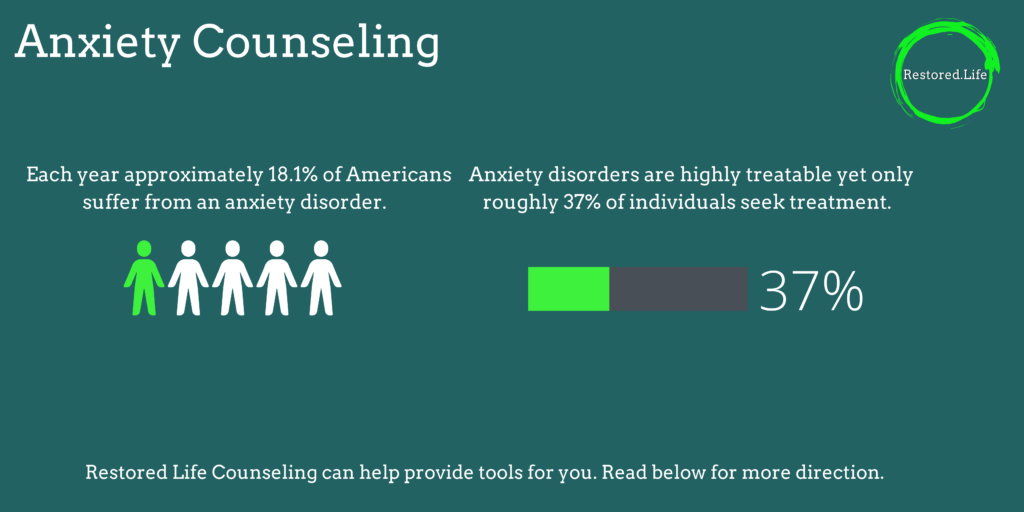What are anxiety symptoms?
The first step toward managing anxiety is recognizing it. People who suffer from anxiety may experience physical symptoms like heart palpitations, sweating, shaking, trembling, shortness of breath, dizziness, nausea, headaches, fatigue, muscle tension, rapid heartbeat, and insomnia. They may feel overwhelmed by thoughts of death, suicide, or self-harm. They may feel unable to cope with daily life. And they may worry excessively about things like job security, relationships, finances, and health.
You Are Not Alone
If you feel anxious, it may be helpful to talk to someone who has experienced similar feelings before. Talking to a friend or family member might help you understand what you’re going through better. A therapist, psychologist, psychiatrist, or counselor could also provide some insight into your situation.

Types of Anxiety Disorders
The most common type of anxiety disorder is Generalized Anxiety Disorder (GAD). This is characterized by excessive worry about everyday life situations. Other types include Panic Disorder, Social Phobia, Obsessive Compulsive Disorder, Post Traumatic Stress Disorder, Specific Phobias, Agoraphobia, and Separation Anxiety.
How Prevalent Is Test Anxiety?
In one study, nearly half of college students reported experiencing test anxiety at some point in their lives. The majority of those who said they were anxious had experienced it within the last year.
What are different types of anxiety?
Panic attacks
The ketogenic diet has shown promise in treating panic attacks. A recent study found that it was effective at reducing symptoms of panic disorder. This may be due to its ability to increase serotonin levels, which helps regulate mood.
Agoraphobia
Agoraphobia is characterized by a fear of being alone in public places. The person may feel like they cannot leave the house because they will not know what to do if they do. This fear can cause panic attacks. People who suffer from agoraphobia may avoid leaving home because they worry about losing control and having a panic attack. They may also avoid going out because they don’t want to experience another panic attack.
Generalized anxiety disorder GAD
The best treatment for generalized anxiety disorder (GAD) is cognitive behavioral therapy (CBT). CBT helps people identify and change unhelpful thoughts and behaviors contributing to their anxiety. CBT is effective in treating GAD. Other treatments include medications like antidepressants and antianxiety drugs.
Obsessive-compulsive disorder OCD
The first step in treating OCD is getting it diagnosed. If you think you may have OCD, talk to your doctor. He or she will ask you some simple questions to determine whether you might have this condition. Your doctor may then refer you to a specialist who specializes in OCD treatment.
Panic disorder
The first step in managing panic attacks is recognizing them. If you notice any of the following symptoms, it may be a sign of a panic attack coming on: feeling like you might die, chest pain, shortness of breath, dizziness, numbness, tingling, sweating, heart palpitations, trembling, shaking, hot flashes, cold sweats, nausea, vomiting, diarrhea, fainting, headache, chills, confusion, blurred vision, muscle aches, fatigue, or trouble breathing.
Posttraumatic stress disorder (PTSD)
A traumatic event triggers a cascade of physiological responses that can lead to post-traumatic stress disorder (PTSD). Symptoms include flashbacks, nightmares, hypervigilance, avoidance behaviors, and emotional numbing. The symptoms may last weeks, months, years, or even a lifetime.
Selective mutism
The term selective mutism refers to a condition where a person refuses to speak in certain situations because they feel anxious or uncomfortable doing so. This may include school, social settings, or religious rituals. Sometimes, it can lead to severe consequences, including physical harm.
Separation anxiety disorder
The best treatment for this condition is cognitive-behavioral therapy (CBT). This type of therapy focuses on teaching children how to cope with anxiety without resorting to behaviors that may cause harm to them or others. CBT helps teach children how to manage their emotions and develop coping skills.
Social Anxiety Disorder
This is also known as social phobia, where an individual has intense anxiety or fear of being judged by others in a social context.
Specific phobias
The specific phobia category includes fears like fear of flying, heights, animals, blood, needles, etc. These are all examples of what I call “fear of the unknown.”
Other common questions related to anxiety:
Can I get diagnosed with anxiety by an online mental health provider?
Yes! If you feel like you might have anxiety, it’s important to seek out professional help. The first step is to see a doctor who specializes in treating anxiety. A psychiatrist will likely ask you a series of questions to assess your symptoms and determine if you may benefit from treatment. They will then refer you to a psychologist or therapist for further evaluation.
What Are the Symptoms of Test Anxiety?
The symptoms of test anxiety include restlessness, muscle tension, sweating, shortness of breath, nausea, heart palpitations, dizziness, headaches, and feeling sick. These symptoms may occur before, during, or after taking a test. They can be mild or severe. Some students experience only minor symptoms, whereas others develop serious problems.
How Is Anxiety Treated?
The first step in treating anxiety is identifying it. This involves asking yourself if you are experiencing any symptoms of anxiety. If so, what kind of anxiety are you feeling? Do you feel anxious all the time or only at certain times? Are you worried about something specific or just generally nervous? Once you know what type of anxiety you are dealing with, you will want to talk to your doctor about treatment options.
How do I find the right mental health provider?
If you’re looking for someone who understands the complexities of anxiety, you may want to look into a psychiatrist. Psychiatrists are medical doctors who specialize in treating mental illness. They are trained to diagnose and treat various mental illnesses, including anxiety, mood disorders, eating disorders, addiction, etc.
Anxiety Disorder Treatments
The best treatment for anxiety is cognitive-behavioral therapy (CBT). CBT focuses on changing behaviors and thinking patterns that lead to anxiety. This type of therapy has been shown to reduce symptoms by 50% to 70%.Anxiety Disorder Outlook
The outlook for anxiety disorder treatment is positive. With new medications and therapies available, we now have effective treatments for panic attacks, generalized anxiety disorder (GAD), social phobia, obsessive-compulsive disorder (OCD), and post-traumatic stress disorder (PTSD).
What are the risk factors for having anxiety?
Some risk factors include low self-esteem, a history of depression, childhood sexual abuse, and being in a disturbed environment. Demographic factors include being female, caucasian, and the number of years in education.
When do panic attacks occur?
Panic attacks can occur at any time, moment, and place. Triggers for panic attacks include long periods of stress, activities that lead to intense physical reactions, and physical changes occurring after an illness or sudden change of the environment.
Are there certain medications that help with anxiety?
Some medications that may be prescribed for anxiety are SSRIs like Prozac, Zoloft, Paxil, Lexapro, and Celexa.
